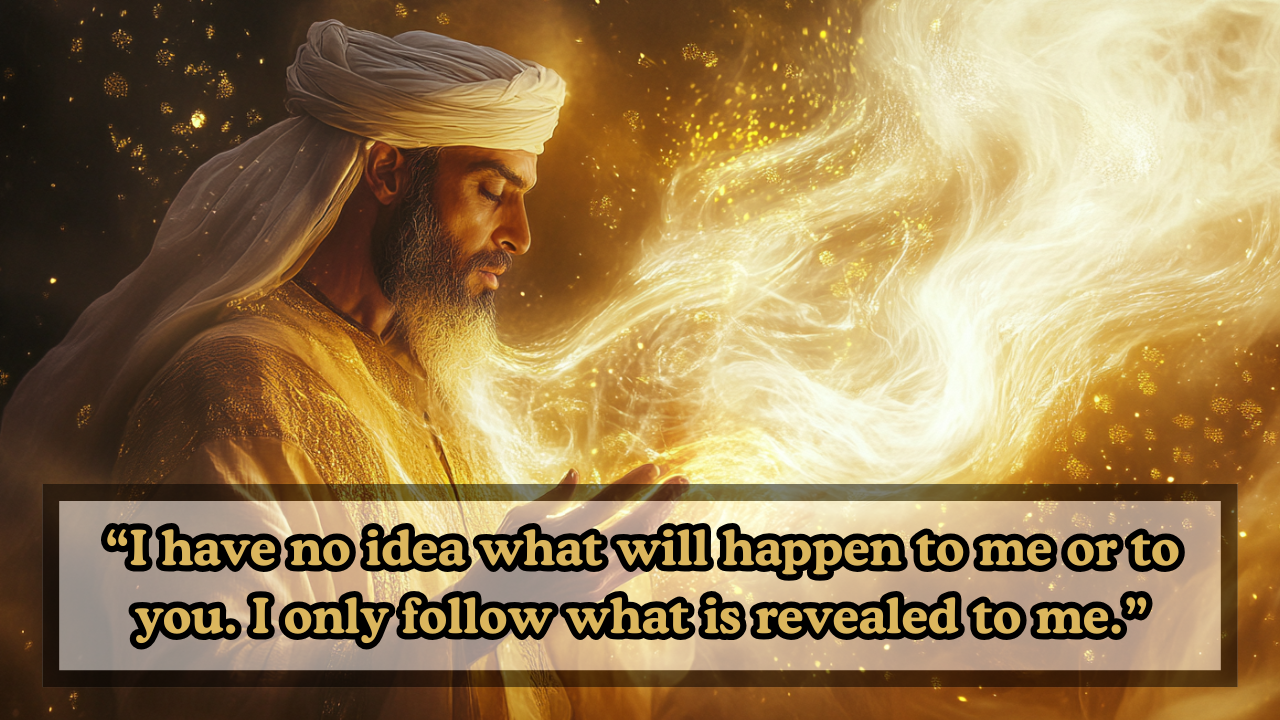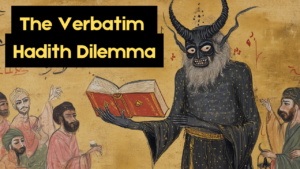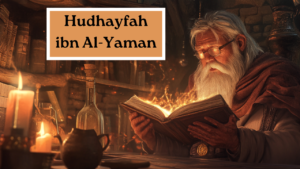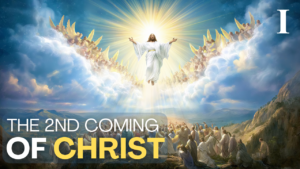The Quran makes it clear in 7:188 that the Prophet Muhammad did not know the future. He was made to say:
“…If I knew the future, I would have increased my wealth, and no harm would have afflicted me. I am no more than a warner, and a bearer of good news for those who believe.”
This sentiment is echoed again in 46:9:
“Say, ‘I am not different from other messengers. I have no idea what will happen to me or to you. I only follow what is revealed to me. I am no more than a profound warner.'”
Despite these clear verses, some claim that Muhammad prophesied future events, portraying him as a type of soothsayer—an idea that the Quran outright denies in 52:29.

One of the main verses cited to support this falsehood is 11:49, which states:
“This is news from the past that We reveal to you. You had no knowledge about them—neither you, nor your people—before this. Therefore, be patient. The ultimate victory belongs to the righteous.”
However, reading 11:49 in context makes it clear that this verse refers to the story of Noah, not future events:
“He said, ‘O Noah, he is not of your family. It is unrighteous to ask Me for something you do not know. I enlighten you, lest you be like the ignorant.’ He said, ‘My Lord, I seek refuge in You, lest I implore You again for something I do not know. Unless You forgive me and have mercy on me, I will be with the losers.'” It was proclaimed: ‘O Noah, disembark with peace and blessings upon you, and upon nations who will descend from your companions. As for the other nations descending from you, We will bless them for a while, then commit them to painful retribution.'”
The context is clear: these were stories of the past revealed to Muhammad through the Quran. A similar statement appears in 3:44, regarding the story of Mary:
“This is news from the past that We reveal to you. You were not there when they drew their raffles to select Mary’s guardian. You were not present when they argued with one another.”
Claiming that 11:49 grants Muhammad knowledge of the future would contradict 7:188, 52:29, and 46:9. Some apologists cite 72:26-27 to argue that Muhammad had knowledge of both past and future events:
” He is the Knower of the future; He does not reveal the future to anyone. Only to a messenger that He chooses does He reveal from the past and the future, specific news.”
However, the Quran clearly states that only specific messengers are given such knowledge. Since 7:188, 52:29, and 46:9 explicitly state that Muhammad did not know the future, this means he was not among those granted future knowledge. Let’s look at potential verses and their counters:
The Prophet Explictly Denied Knowing The Future:
Say, “I have no power to benefit myself, or harm myself. Only what God wills happens to me. If I knew the future, I would have increased my wealth, and no harm would have afflicted me. I am no more than a warner, and a bearer of good news for those who believe.”
-Quran 7:188
Say, “I am not different from other messengers. I have no idea what will happen to me or to you. I only follow what is revealed to me. I am no more than a profound warner.”
-Quran 46:9
Verses Apologists Use To Say The Prophet Knew The Future & Refutation
2:119 – The Fate of People
We have sent you* with the truth as a bearer of good news, as well as a warner. You are not answerable for those who incur Hell.
-Quran 2:119
Traditionalists argue that when God says, “bearer of good news” and a “warner”, that this means Muhammad had insight into the future rewards and punishments. In reality, it’s referring to the message of the Quran, not personal knowledge of the future. 46:9 makes it clear that Muhammad himself did not know his own fate. The distinction between bearing news versus having personal knowledge is critical here. A messenger’s role is fundamentally about transmission, not origination. We see this pattern throughout the Quran where prophets are described as “bearers” (mubashshir) and “warners” (nadhir) – terms that emphasize their role as communicators rather than sources. The specific pairing of “good news” and “warning” points to the dual nature of the message itself, rather than suggesting supernatural knowledge.
3:44 – News from The Past
This is news from the past that we reveal to you. You were not there when they drew their raffles to select Mary’s guardian. You were not present when they argued with one another.
-Quran 3:44
Traditionalists argue that if Muhammad was given knowledge of the past, it is possible that he was also granted knowledge of the future. The verse explicitly states that this is news from the past, not the future. Similar wording appears in 11:49, which is also about past events. This verse is particularly interesting because it explicitly frames the knowledge as revelatory rather than innate. The phrase “news from the past” (min anba’ al-ghayb) uses terminology that specifically refers to information being disclosed or unveiled. This same pattern appears in other Quranic narratives about past events, like the story of Noah (11:49) and Joseph (12:102), where the knowledge is clearly marked as divine disclosure rather than prophetic omniscience.
8:7 – God’s Promise
Recall that God promised you victory over a certain group, but you still wanted to face the weaker group. It was God’s plan to establish the truth with His words, and to defeat the disbelievers.
-Quran 8:7
Traditionalists argue that Muhammad knew the outcome of battles because God informed him beforehand. This was a promise from God, not Muhammad’s own foresight. Muhammad only knew what was revealed to him at the time (46:9) and did not have personal knowledge of the future (7:188). The narrative context of this verse is crucial – it describes a battle, where the verse explicitly states that the Submitters preferred to face the weaker group rather than the stronger army. If Muhammad had personal future knowledge, this preference for the easier target would make little sense. The verse instead shows strategic human decision-making being guided by divine promise, not supernatural foresight. The phrase “God’s plan” (yurid-Allah) specifically attributes the outcome to divine Will rather than prophetic knowledge.
30:2, 3, 4 – Revelation of The Romans Conquering
Certainly, the Romans will be defeated. In the nearest land. After their defeat, they will rise again and win. Within several years. Such is God’s decision, both in the first prophecy, and the second. On that day, the believers shall rejoice…
-Quran 30:2-4
Traditionalists argue that this is a prophecy made by Muhammad about the future victory of the Romans. This was a revelation from God, not Muhammad’s personal knowledge of the future. He only conveyed what was revealed to him (46:9). The structure of this prophecy is worth examining closely. It’s framed as “God’s decision” (lillahi al-amr), explicitly attributing the knowledge to God. The timeframe is notably vague (“several years”), which differs from how one would expect a prophecy based on personal future knowledge to be structured. The focus on God’s agency in both the “first and second” decisions emphasizes divine rather than prophetic authority over future events.
48:27 – Conquest of Mecca
God has fulfilled His messenger’s truthful vision: “You will enter the Sacred Masjid, God willing, perfectly secure, and you will cut your hair or shorten it (as you fulfill the pilgrimage rituals) there. You will not have any fear. Since He knew what you did not know, He has coupled this with an immediate victory.”
-Quran 48:27
Traditionalists argue that this is an example of Muhammad receiving a vision of the future. This vision was granted by God, not something Muhammad knew on his own. The phrase “God willing” reinforces that the future is only in God’s knowledge. The conditional nature of this vision is significant – the phrase “God willing” (in sha’ Allah) indicates uncertainty and dependency on divine will. This matches the Quranic paradigm where even prophets must acknowledge the contingent nature of future events. The verse itself notes that God “knew what you did not know,” explicitly stating the limitations of human knowledge, including Muhammad’s.
54:45, 46 – Defeat of Quraish
All of them will be defeated; they will turn around and flee. The Hour is awaiting them, and the Hour is far worse and more painful.
-Quran 54:46
Traditionalists argue that Muhammad predicted the defeat of the Quraysh before it happened. This was a divine revelation, not Muhammad’s own knowledge. He only conveyed what was revealed to him by God, as stated in 46:9. The context shows this as part of a larger sequence of divine warnings and promises, consistent with the Quranic pattern of revealed rather than personal knowledge. The verse occurs within a passage discussing divine intervention in historical events, framing it as part of God’s system (sunnah) rather than prophetic foresight. The mention of “the Hour” immediately after draws attention to the ultimate future knowledge that remains with God.
News from The Past, & News from The Future
The verses in 72:26-27 establish a key principle: while God may choose certain messengers to receive specific future news, this must be understood in light of clear statements about Muhammad’s limitations in 7:188 and 46:9. Let’s examine this carefully. Muhammad explicitly states in 7:188:
Say, “I have no power to benefit myself, or harm myself. Only what God wills happens to me. If I knew the future, I would have increased my wealth, and no harm would have afflicted me. I am no more than a warner, and a bearer of good news for those who believe.”
This is an unambiguous declaration of his inability to know the future. Similarly, 46:9 reinforces: “I do not know what will happen to me or to you. I only follow what is revealed to me.” These clear statements create an interpretive framework through which we must understand 72:26-27. While these verses indicate that God may choose certain messengers to receive future knowledge, Muhammad’s own words place him outside this category. This framework is further strengthened by 72:25, where just verses before discussing chosen messengers who receive future knowledge, Muhammad explicitly states “I do not know if what is promised to you will happen soon, or if my Lord will delay it for awhile.”
[72:25] Say, “I do not know if what is promised to you will happen soon, or if my Lord will delay it for awhile.“
[72:26] He is the Knower of the future; He does not reveal the future to anyone.
[72:27] Only to a messenger that He chooses,* does He reveal from the past and the future, specific news.*
The proximity of this admission of not knowing the future to the verses about chosen messengers (72:26-27) demonstrates that Muhammad was not among those selected for future knowledge. It would be illogical for the Quran to have Muhammad declare his ignorance of future events in 72:25 and immediately include him among those who receive future knowledge in 72:27.
If this was the case, it would directly contradict his statements in 7:188 and 46:9. The Quran consistently emphasizes its freedom from contradictions (4:82), so we must interpret these verses harmoniously. Even Ibn Kathir understands this framework:

When Muhammad received prophecies (like in 30:2-4 about the Romans), they were explicitly marked as divine revelations, not personal knowledge. This pattern supports that he was a transmitter of revealed prophecies rather than a possessor of future knowledge. The grammatical structure of 72:27 is telling – it describes a specific subset of messengers (man irtada min rasul), not all messengers. This allows for the existence of messengers who weren’t granted this type of knowledge, aligning with Muhammad’s statements about his own limitations. The context of the full passage (72:26-28) emphasizes God’s complete knowledge and control over revelation, rather than the abilities of any messenger. This supports reading these verses as establishing God’s authority over future knowledge rather than granting comprehensive future knowledge to messengers. This interpretation resolves what might otherwise appear to be a contradiction in the Quran. It shows that while God may grant specific future knowledge to some messengers, Muhammad explicitly identified himself as not being among them, instead defining his role as purely transmitting the revelation he received.
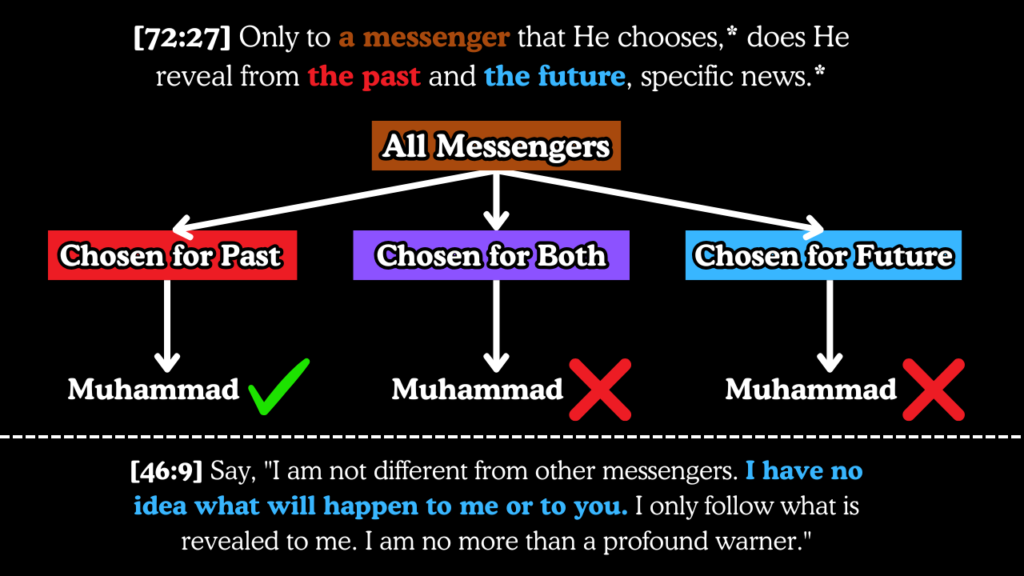
Sunni Mufasir (Exegete) Agrees With 7:188 – Muhammad Didn’t Know The Future
Here’s the translation of the provided excerpt from Tafseer al-Jaami’ al-Bayaan fi Tafseer al-Quran by Al-Tabari:
Translation:
[Say, “I do not possess for myself any benefit or harm except what Allah wills. And if I knew the unseen, I would have accumulated much good, and no harm would have touched me. I am but a warner and a bearer of good tidings for a people who believe.”]
Allah, Exalted be He, says to His Prophet Muhammad (peace be upon him): “Say, O Muhammad, to the one asking you about the Hour, when it will be established: I do not possess for myself any benefit or harm,” meaning: “I do not have the ability to bring any benefit to myself or to ward off harm from myself, except for what Allah has decreed for me to have, by empowering and assisting me with it.”
“And if I knew the unseen,” meaning if I had knowledge of that which is yet to occur, “I would have accumulated much good,” meaning, “I would have prepared an abundance of good deeds.” Then, scholars of interpretation (tafsir) disagreed about what “good” refers to in this context. Some said it refers to righteous actions, and some mentioned specific examples of the unseen, like knowing when and where one’s death would occur, which would lead to a preparation of good deeds. (this contradicts Sahih al-Bukhari 3699)
A narration attributed to Ibn Jariyj states that “knowing the unseen” refers to knowledge of guidance and misguidance, meaning if the Prophet knew who would be guided and who would be misled, he would have acted differently to increase the guidance for people. Another interpretation of “good” is that if the Prophet knew when and where the drought or famine would happen, he would have prepared for it accordingly.
“And no harm would have touched me,” meaning: “If I knew the unseen, I would have avoided any harm or difficulty.” In essence, Allah is saying that the Prophet is not privy to knowledge of what will happen, whether good or bad, because such knowledge belongs solely to Allah.
“I am but a warner and a bearer of good tidings for a people who believe,” meaning: “I am just a messenger sent by Allah to warn those who disbelieve of the consequences of their disbelief, and to give glad tidings to those who believe and follow the truth with the reward and honor from Allah.”
The Prophet Was Not a Soothsayer
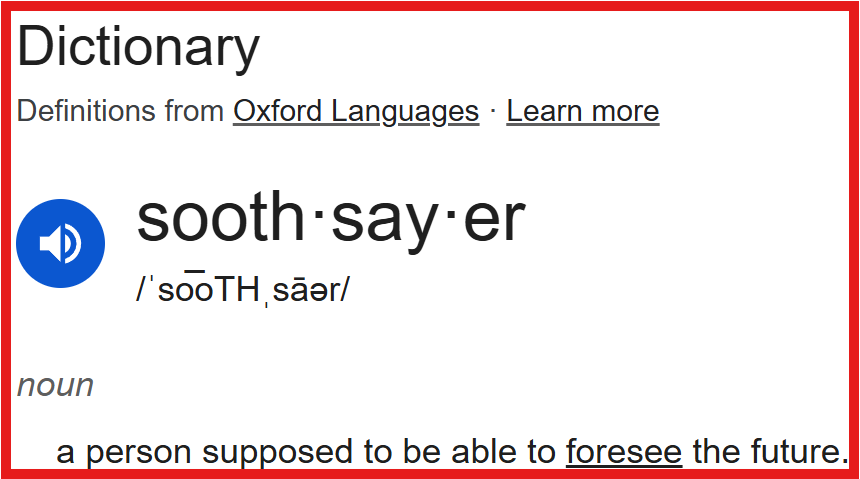
There are those out there who seek to defy these clear verses by claiming the prophet Muhammad prophesied events in the future as if he was a type of soothsayer (the Quran denies such a blasphemous accusation in 52:29), suggesting that he possessed the ability to foresee future occurrences in the same way fortune tellers or mediums claim to do. However, this claim directly contradicts the teachings of the Qur’an, which makes it unequivocally clear that the Prophet Muhammad was not a soothsayer, nor did he possess any inherent knowledge of the unseen, aside from what was revealed to him by God.
You shall remind the people. With your Lord’s blessings upon you, you are neither a soothsayer, nor crazy.
Tafsir Al-Jami’ al-Bayan fi Tafsir al-Quran by Al-Tabari (d. 310 AH)
{ فَذَكِّرْ فَمَا أَنتَ بِنِعْمَةِ رَبِّكَ بِكَاهِنٍ وَلاَ مَجْنُونٍ } * { أَمْ يَقُولُونَ شَاعِرٌ نَّتَرَبَّصُ بِهِ رَيْبَ ٱلْمَنُونِ } * { قُلْ تَرَبَّصُواْ فَإِنِّي مَعَكُمْ مِّنَ ٱلْمُتَرَبِّصِينَ }
Allah, exalted be His mention, says to His Prophet Muhammad (peace be upon him): “So remind them, for you are not, by the grace of your Lord, a soothsayer or a madman.” (Quran 52:29) and “Or do they say, ‘He is a poet, we are awaiting for him some misfortune of time’” (Quran 52:30). Allah instructs the Prophet to remind the people of His blessings and to clarify that he is neither a soothsayer nor a madman. Rather, he is the Messenger of Allah, whom Allah will aid and support, not forsake.
This reinforces the idea that while Muhammad was the recipient of the ultimate and final revelation (the Quran), and he was not chosen to receive knowledge about future events. His role was to deliver the message of Submission, serve as a messenger, and warn his people, but not to predict specific future occurrences. Therefore, any claim that he knew the future — even if it’s in the form of hadiths or narrations — conflicts with the Quranic portrayal of his role and his own statements regarding his limitations.
